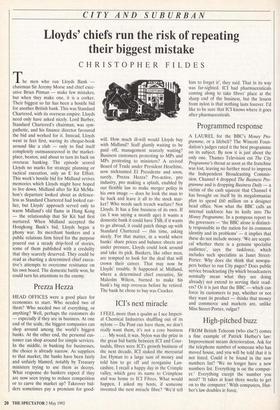Prezza Hezza
HEAD OFFICES were a good place for economies to start. Who needed two of them? Who needed two of everything, or anything? Well, perhaps the customers do — especially if they are in business. At one end of the scale, the biggest companies can shop around among the world's biggest banks. At the other end, the personal cus- tomer can shop around for simple services. In the middle, in banking for businesses, the choice is already narrow. As suppliers to that market, the banks have been fairly and unfairly blamed, notably by Treasury ministers trying to use them as decoys. What response do bankers expect if they are now seen trying to reduce competition or to carve the market up? Takeover bid- ders sometimes pay a premium for good- will. How much would Lloyds buy with Midland? Staff glumly waiting to be paid off, management scarcely waiting? Business customers protesting to MPs and MPs protesting to ministers? A revived Board of Trade under President Heseltine, now nicknamed El Presidente and soon, surely, Prezza Hezza? Pro-active, pro industry, pro making a splash, enabled by our flexible law to make merger policy in his own image — does he look the man to lie back and leave it all to the stock mar- ket? Who needs such trench warfare? Not Lloyds. It has a fine business of its own. If (as I was saying a month ago) it wants a domestic bank it could have TSB, if it wants to go abroad, it could patch things up with Standard Chartered — this time, asking nicely. For that matter, in a world where banks' share prices and balance sheets are under pressure, Lloyds could look around and take its pick. Bankers, like other men, are tempted to look for the deal that will crown their career. That may now be Lloyds' trouble. It happened at Midland, where a determined chief executive, Sir Malcolm Wilcox, burned to make his bank's big step overseas before he retired. The bank he chose to buy was Crocker.


















































 Previous page
Previous page